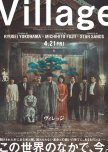
Larger-than-life tragedy about... work health and safety?
Yuu, when we first meet him, is in a state of misery. He works at his village's mega waste facility as a garbage sorter by day and illegal waste dumper by night, coerced into the work due to his mother's gambling addiction. His life takes a turn for the better when his childhood friend, Misaki, moves back to the town. The two share a love of Noh: an important tradition in the village.From the start, the stakes are clear: environmental destruction, worker exposure to deadly hazards, and deep corruption among local authorities. In many respects, this film could have been a documentary. The tale it tells is one currently happening around the world.
But to avoid banality and hitting too close to home, the film's creators have opted for a larger-than-life tragedy approach to the story. The result is a high quality production with beautiful cinematography, especially the shots focussing on the Noh tradition of the village. Unfortunately, this comes at a cost to narrative cohesion, character development, and pacing.
The split focus of The Village means it ultimately fails to pack a punch. While it does have a strong tragedy element that explores the morally ambiguous nature of coerced labour, the supporting characters are just a little too underdeveloped to make it work. Maybe give this reel a sharp edit and try again.
Was this review helpful to you?

Just go watch Lost instead
Anatahan is a fictional retelling of the Japanese soldiers stranded on the Pacific island of Anatahan from 1944 to 1951. In both the real story and this one, they refused to believe the war was over.This film features a Japanese cast and has dialogue all in Japanese, but the director (who also narrates the story in English) is a white dude who lathers the story with a heap of racist exotification and sexism. All in all, it's a pretty Western production.
As such, the story ends up as a crude Lord the Flies with the one woman on the island tossed around as part of the ongoing power struggle. The narrator and the other characters spend the entire film objectifying and harassing her (also content warning for domestic violence and rape, if you plan on watching this).
It's a shame because the premise of the story is an interesting one. Holding out on a stranded island for years on end has been the premise of many of a good piece of cinema. Yet this film flops. Badly.
Was this review helpful to you?
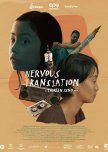
It makes sense that a pen solves anxiety
After all, what Nervous Translation depicts so well is the eclectic reasoning of childhood. Following the character of Yael, I'm reminded of the way I made sense of the world at a similar age. Snippets of TV, bits of adult conversation, the intensity of school mathematics.Yael's mum, Val, juggles exhaustion due to work, keeping her own private boundaries, and looking after family. She is real. We all know a Val or we are a Val.
Nervous Translation is a slice of life. I found the pacing to be a little too slow but, then again, the emotion did creep up on me near the end. At times, it verges on surrealism, sometimes with effect, sometimes less so.
A good film with a gentle touch on life's anxieties.
Was this review helpful to you?

Body swap done perfectly
Normally I find body-swap to be incredibly cringe but I found myself enjoying it for the first time since watching Freaky Friday as a kid. Yu Shuxin and Dylan Wang really show off their acting skills. Because they do this very early on in the series, I was pulled in by the comedic element and kept watching from there.The romance is sweet and although the FL/ML chemistry was strong, I never fully bought it. The support characters are fun albeit predictable.
But the real downfall for me was the plotline. I felt we were just starting to get somewhere in the storyline when the drama ended – similar to how I felt Princess Agents was cut short although at least this time it was a lot less jarring.
Was this review helpful to you?

Arthdal Chronicles Part 2: The Sky Turning Inside Out, Rising Land
0 people found this review helpful
Political intrigue with a lil bit of unionism snuck in too :)
~Review of Part II only~And here the plot thickens! We have emerged from the initial shock of invasion and now must deal with the logic of Arthdal. We are introduced to new characters and the storylines are separated for most of these six episodes.
Normally, I don't enjoy multi-perspective narratives because you almost always end up hating one storyline. But this was a rare exception for me – I thought they were interesting and well paced. It's a balancing act you don't see done effectively in cinema often enough.
Also big yay for the unionism :) We love worker solidarity.
As I mentioned in my interview for Part I, one thing I like about Arthdal Chronicles is how it treats spiritual agency. By spiritual agency, I mean the role of the spiritual world (rather than necessarily 'religion' because that's often associated with a man-made institution). This is the first piece of historical fiction I've seen to treat the spiritual world as a legitimate agent and as a political tool at the same time. Too often, historical fiction sees a belief in a spiritual world and then a political cynicism of religion to be mutually exclusive.
However, as seen in the characters of Tagon, Taheala and Tanya, they all have belief (of varying degrees) in higher powers but also will use those higher powers – and their religious institutions – for their own ends. I have a sneaking suspicion I'm probably the only person who's watched this series who cares about this point, but I'm a politics nerd, ok? (But if that does catch your interest, I do recommend reading Provincializing Europe by Dipesh Chakrabarty and where he critiques secular histories.)
Don't get me wrong, Arthdal Chronicles isn't perfect. One big downside for me was I started noticing in this section of the series that the music can be a bit lacklustre at times. I can't remember if it was in Part II or Part III but there were some awkward audio cuts too.
Was this review helpful to you?
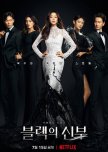
A standard revenge-romance watch with some poor taste (CW: mention of rape)
Normally, I don't care about watching rich people deal with rich people problems, but there was just enough happening to pull me through all eight episodes. The strong acting provided support where the plot failed to provide substantial meat on bone. I think the writers had a good preliminary concept here but just failed to bring it to its full potential.However, what bugged me thoughout the entire show was the 'woman lies about being raped' trope. First, it falls into the sexist myth of 'if a woman claims rape, she is most likely lying'. Of course, this is not true. I don't know international stats, but in Australia, studies find, on average, only 5% of rape allegations are found to be false (and remember, most survivor/victims don't report and so aren't in the data). In other words, when someone says they've been raped, they're very very very likely to be telling the truth.
Second, the show refuses to grapple with the fact that someone can co-exist as a survivor/victim *and* as a bad human being. As far as characterisation goes, it meant the writers could draw an easy 'good/bad' line between the main characters. Thus, not only did the 'good' character not owe the 'bad' character any pity , but the 'good' character's own refusal to believe the rape claim goes unchallenged throughout all eight episodes.
Apart from that, I did enjoy this series as an easy watch. It was actually a lot of fun once I stopped taking it too seriously.
Was this review helpful to you?
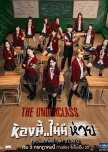
A wholesome and fun YA drama with some refreshing originality
I was intrigued by the premise of The Underclass: a school where everything hinges on academic rankings. I had no idea what BNK48 even was until I'd finished the the series and read the other reviews here so that connection wasn't a factor for me.For me, the appeal was how the drama depicted the joy and struggle of teens figuring themselves out while simultaneously combatting unfair demands and expectations. It did so without being overtly didactic or condescending.
Although there were very recognisable clichés underpinning the entire series, there were also moments of refreshing originality in certain character dynamics and plot points. Most of the characters felt real (with the exception of the more artificial 'bad guys') and, despite the clichés, the school ranking system was actually only a slight exaggeration of my own school experience. I found a lot of my teenage-self in the characters.
That said, at times the ensemble cast felt a little unwieldy – there were perhaps one or two supporting actors too many – but the acting quality itself was of okay quality among the cast. Some of the production quality was patchy every now and then.
Overall, this is a fun Young Adult drama with a good mix of originality and reliable tropes to make it an easy watch.
Was this review helpful to you?

Don't take it too seriously – it's a fun mixed genre Young Adult drama
The Ghost Bride has its faults but what drew me in was the rich world-building. I've never watched anything set in historical Malaysia before nor had I ever encountered the idea of 'ghost brides' before reading the YA novel this series derives from. Those two elements plus the Underworld setting meant that I wasn't too fussed about the characters because the variety of settings became fascinating characters in their own right.I think other reviews have assessed the actual characters well. Special mention goes to Chris Wu just because of his range: I've now seen him perform beautifully in huge different roles in Ghost Bride, Autumn's Concerto, and Shards of Her. Boy, can he act!
I think it is important to remember that this is meant for a younger audience. I was more forgiving than I would normally be about the lack of depth for some of the characters because of the 'Young Adult' genre. There tends to be a certain naîve sheen that comes with that. Normally, I'd be critiquing the class politics too – notice how Amah and Lao Wong are uncritically loyal to the Pan family – but, again, it's a YA audience in mind so I can understand how it could've complicated the story too much.
Overall, this is a fun mystery/fantasy drama with a touch of romance that strays just far enough away from usual YA tropes to stand on its own two legs.
Was this review helpful to you?
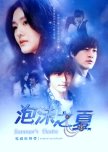
Super problematic but still rewatched it like 6 times
I'm pretty sure this was the first non-English language drama I ever watched – I was 12 yo when Summer's Desire came out and a friend at school was watching it. I've rewatched it a handful of times since. But I think just because it was the first ever Taiwanese drama I'd watched, not because it was particularly good. I can't deny this is my most re-watched drama, hence the generous star number there.Look, be warned, this drama has heaps of problematic elements to it. Ok, I'm understating that a lot. I've given this a low rating because this drama has nothing to do with love and everything to do with coercive control. so **big content warning** there. There's no rape scenes thankfully, but it's clear that consent is not a big priority.
Also, as other reviews have noted, this drama is brimming with clichés. Turns out, it was a great drama to begin with because it introduced me to almost all the tropes of Taiwanese and C-Dramas in one go. I also think it took at least three re-watches for me to fully understand the plotline. But, let's be real, you're not watching Summer's Desire for the plot.
The chemistry between the three lead actors is really well done (somewhat despite a sub-par performance from Barbie Hsu who doesn't match her Meteor Garden efforts). The actors do pretty darn well in spite of the cliché characters and dialogue. The support actors also do well to provide emotional depth to the storyline.
The OST is great and makes up for the fact the overall audio quality is a bit patchy (this seemed to be a common thing among Taiwanese dramas of this era, I've now noticed). Just weird audio levels around dialogue and general atmosphere.
Was this review helpful to you?

Took me FIVE YEARS to slog through this drama
In the time it has taken me to scrape and crawl through this drama I have:– Lived through 5 Covid lockdowns
– Changed jobs 4 times
– Moved house 3 times
– Learnt 2 semesters of Mandarin, and
– Breathed the 1 biggest sigh of relief when I reached the credits of the final episode.
Class dynamics, who even is she? I'm a hard agree with Graeme Smith who describes this version of Meteor Garden as "unwatchable". In his article for The Interpreter, he says, "A drama about class divisions set in present-day China – where class divisions aren’t up for discussion – was never going to work."
It's true. Everyone in the series looks like they're acting in a laundry commercial. The sets are sparkly clean, all the actors have amazing teeth, and there is no way Shancai would be able to survive off the occasional shift she does at the bubble tea store.
By removing the class tensions that drove the Taiwanese version (and that was still relatively sanitised – it is a soap opera, after all), the creators gutted the life out of the drama.
It's also just hella boring. I felt no chemistry in any of the romantic relationships. I didn't particularly care about anyone's fate. And I say this as someone who *loves* championing an underdog. But because the class divisions "aren't up for discussion", Shancai isn't really an underdog. And so I found it hard to care much about her so-called struggles.
It got to the point where I was using diversions to keep myself watching. One fun game was tracking the disappearances and re-appearances of Daoming Si's earring/s. It was like playing Spotto with continuity errors.
For the sake of pushing through the last dozen episodes, I put the playback on 1.5x speed (as fast as Netflix would let me), which added an unintended comedic element. It also demonstrated how much screen time went to waste.
However, I'm going to be reeeeeally nice and end on a couple of (backhanded) positives. I did appreciate the music covers and the cameos from the Taiwanese version (but this is nostalgia and should be attributed to the 2001 series). I did also enjoy bits of Darren Chen's performance as Huaze Lei. He made the character seem almost complex, particularly in comparison to the cardboard cutouts that accompanied him on screen.
Was this review helpful to you?

Arthdal Chronicles Part 1: The Children of Prophecy
0 people found this review helpful
Arthdal Chronicles was way more interesting than my political science degree
~Review of Part I only~Honestly, the political drama genre is almost dead to me at this pint. I'm sick of men in suits flouncing around parliament corridors pursued by journalists. I'm also tired of the high fantasy spin on the political drama genre which ends up just being an excuse to objectify women and showcase long-winded battle scenes. So I was thankful when I started watching Arthdal Chronicles for the breath of fresh air.
Part One – the first six episodes of the series – is all about the rich world-building. You're introduced to the characters, their settings, and the key political dynamics that set up the rest of the series.
These six episodes set the key themes for the rest of the series. These revolve around empire/nation building, racialisation, and spiritual agency. The show writers have been careful in their political crafting. They haven't just opted for a simple coloniser versus colonised binary, and instead have woven in layers of nuance right from the opening scene.
The writers also don't seem too keen on didacticism. The colonising act (trying to avoid spoilers here) is certainly depicted as cruel, but at this point the audience already has sympathy for characters on both sides. Ditto in regards to Neanthal, Igutu and Saram dynamics. This way, the characters and plot are able to achieve complexity and depth – the result being a beautifully rich world.
There's also something interesting happening with how the series treats religion/spirituality that means I'm refraining from calling this a fantasy series, but I'll get to that in my review for Part Two.
Was this review helpful to you?






